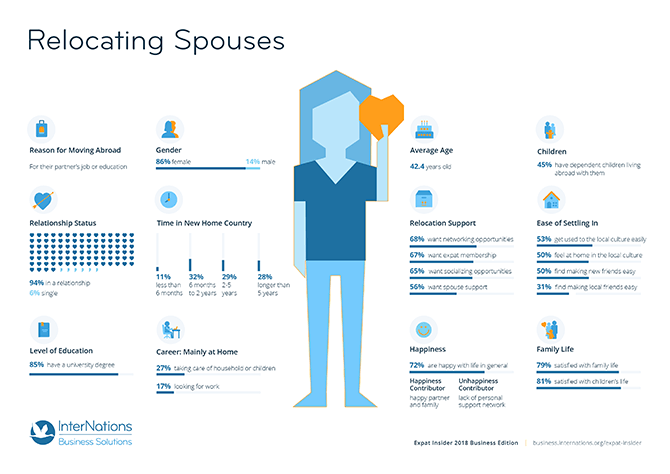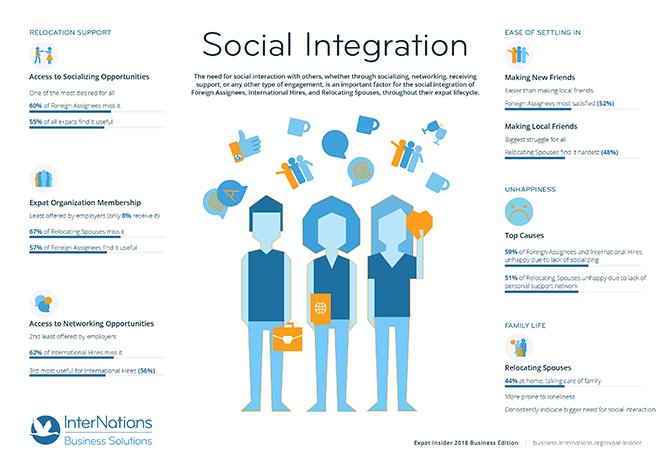Peer-to-Peer empowerment: a win-win solution
Peer-to-peer support is an important tool for professionals who manage a high-performing global workforce. Theresa Häfner and Lindsay Lydon, from social community platform and business provider InterNations Business Solutions, outline the benefits of connecting the dots between peer-to-peer empowerment and global talent mobility.
Addressing key expat challenges
Challenges that expats face when moving abroad include administrative and organizational tasks, a different work environment, onboarding at work and cultural differences. Furthermore, expats need to establish a new social network and daily routine outside of work, as well as the need to deal with the practical aspects of living abroad. Those in relationships and with families also need to ensure that their partner and children are happy.Watch highlights from the 2019 Festival:The Expat Insider 2018 Business Edition, a report based on the InterNations Expat Insider survey of 18,135 expats, identified big needs for personal and social support. Of the assignees and partners that participated in the survey and stated unhappiness, not having personal support and socializing opportunities stood out as the top two reasons for their discontentedness. The lack of a personal support network caused 45 per cent of assignees and 51 per cent of partners to be unhappy, while not having access to local socializing opportunities caused the unhappiness of 59 per cent of assignees and 47 per cent of partners. Struggling with the practical aspects of living abroad also made 23 per cent of the partners unhappy.
 Furthermore, 61 per cent of assignees missed access to local networking opportunities, while 56 per cent of partners missed additional spouse support and 49 per cent missed receiving information on local life.
Furthermore, 61 per cent of assignees missed access to local networking opportunities, while 56 per cent of partners missed additional spouse support and 49 per cent missed receiving information on local life. These types of expat needs can easily be addressed through peer-to-peer support as it primarily entails getting information and personal feedback and having an exchange with people who are, or have been, in similar situations. It is a key element in receiving practical tips and advice, getting to know new people and building real relationships in order to feel supported and integrated abroad — beyond work. Expats need to rebuild their sense of community when abroad and peer-to-peer support empowers them to do so.
Social integration is part of an employer’s responsibility
The private lives of employees should certainly stay private, however, relocating for work has a strong influence on a private level that can’t be ignored by an employer. A responsible employer should take care of this private side, through peer-to-peer empowerment and social integration support. It is not about paying for an employee’s private gain only. It is about the employee as a whole person — professionally, in terms of skills, knowledge and talent, and personally, in terms of emotions and well-being. An unhappy employee can’t focus on work and be successful. Social integration, therefore, has a significant impact on productivity at work and the organisation’s success.

An efficient self-service solution for employers
Peer-to-peer support gives expats and their partners the choice of how and when to use it. It importantly also takes the load off global mobility and HR teams, making it a scalable solution across industries and geographies. Instead of asking their global mobility or HR managers for help, global employees have a means to do it themselves.On the other hand, impact is guaranteed as peer-to-peer support offers a very personalized and individual solution, as opposed to a costly benefit offer that might not even be needed by the employee. Considering that many companies try to reduce workload by outsourcing, the peer-to-peer approach replaces some of the typical relocation services — at a low cost.It really is a win-win solution for expats, their partners, and employers — it’s just a matter of connecting the dots.
Peer-to-peer empowerment: a win-win solution for expats, their partners and employers

Theresa Häfner and Lindsay Lydon of InterNations Business Solutions, will be outlining the benefits of peer-to-peer support on the global workforce at the Festival of Global People.
Peer-to-peer support is an important tool for professionals who manage a high-performing global workforce. The global talent mobility experts, Theresa Häfner (Head of Business Solutions at InterNations) and Lindsay Lydon (Senior Business Solutions Consultant), will connect the dots between peer-to-peer empowerment and global talent mobility. They will unpack what peer-to-peer empowerment in this context entails and why this concept is highly beneficial to expats, their partners and employers.As expats need to rebuild their sense of community when abroad, peer-to-peer support is a powerful tool that can empower them to do so. Findings from the Expat Insider 2018 Business Edition, a report based on the InterNations Expat Insider survey of 18,135 expats, will be shared and prove the need that expats and their partners have to get practical tips and advice, and to feel personally and socially supported — beyond work.



































